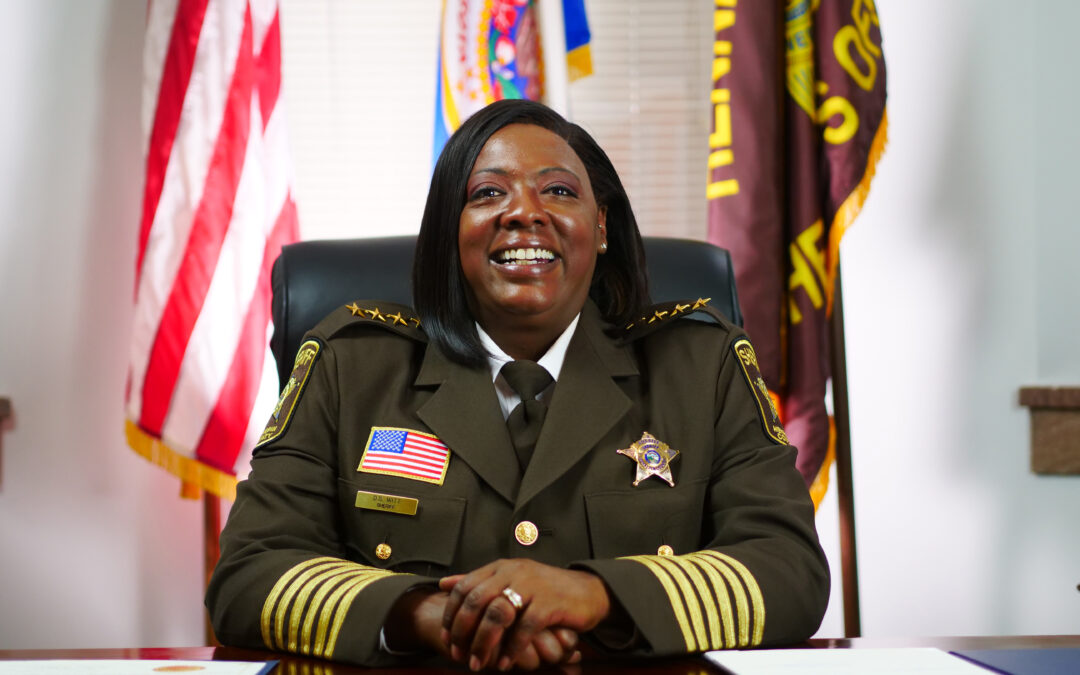Witt builds relationships as Hennepin County sheriff
For a significant portion of her young life, Hennepin County Sheriff Dawanna Witt B’07, M’13 only associated negative feelings with police officers.
“With my childhood and the challenges we had, I did not like, nor trust, law enforcement. There were bad experiences witnessed in my family,” she said.
As sheriff of the largest sheriff’s office in the State of Minnesota since January 2023, one of Witt’s goals is to build relationships between law enforcement and those they serve — to be, as she says, the person her family, her community, and her county needs to see … to be the person she as a young woman needed to see.
Despite her efforts, sometimes people haven’t been receptive to her efforts, particularly following the pain and unrest of the murder of George Floyd.
“I have to be honest. During this time I was called some of the worst names,” she said, shaking her head. “I’ve never cried so much in my life. I felt the anger, and I felt their pain but what hurt me the most was — oh my goodness — all I wanted to be was the person that my family, my community, needed to see. For a short time I felt like I’d wasted my life in this career. It was really difficult getting through that. But something inside me said, ‘You’ve got to get up and keep talking to people.’ I didn’t hide in my office. I had to toughen up and take it. I talked to people even if they didn’t want me there, trying to build those relationships.
“I understand the hurt and the anger. I’m not forgetting where I came from. I’m leading from the front in that way.”
Witt’s desire to help others started as a young child living in Minneapolis.
“I had a difficult childhood and was one of five kids,” she said. “I was taking care of my siblings and trying to protect them from all the bad things going on around us. I had a daughter at 15. I left home as a teen and lived on my own, raising her, going to school, playing basketball, and working two jobs.”
She says one of the best things that ever happened to her was receiving a Justice Alan Page Scholarship. Part of the scholarship included a two-year volunteer commitment. Witt chose to work with kids, mostly young girls, from a diverse community, who had never played organized sports. She taught them how to play basketball and softball, and that two-year commitment joyfully grew to 10.
“I feel like I was paid because it made me happy watching them grow and being a part of their lives. It filled my heart,” she said.
In college, she studied chemical dependency and family therapy and continued on a path of service by working in the nonprofit field.
She had a friend who was a juvenile probation officer, and while taking a tour of the Hennepin County Jail, she learned they were looking for female detention deputies, specifically women of color.
“I had never considered that because of my feelings about police officers,” she said. “I thought, ‘This isn’t the same as a police officer, so I can do this job.’ ” As she took on the role of detention deputy in 2000, she began to have more interaction with police officers.
“That was the only thing that could break down those barriers,” she said. “I needed that communication and interaction so I could see for myself that they weren’t what I thought.”
Witt began to see how she could advance her career in law enforcement and returned to school to be a licensed peace officer. In 2004, she was hired by the Dakota County Sheriff’s office, where she had a wide range of roles for the next 16 years, working her way up to captain — the first woman captain to serve Dakota County.
When Witt left Dakota County and returned to Hennepin County, she said she sat down with every woman she had worked with in the department. “I asked, ‘Who is going to be next?’ We have to represent. What is the resistance about women wanting to take on those responsibilities? You can’t be what you can’t see. And we are always trying to recruit more women.
“Women bring a different skill set to this position,” she added. “We know women have demonstrated less use of force in de-escalating intense situations. But also, we police women. And I believe we should be reflective of the community we police. We bring our experience and our lenses to situations just because of our gender alone. We may have some similar types of experiences where we can relate. I am a mom, I’m a grandma. I feel like I can draw on my experiences to de-escalate another mother.”
As Witt’s career was growing, she found Saint Mary’s and earned a bachelor’s degree in Police Science in 2007, and master’s degrees in Public Safety Administration and Human Resources, both in 2013.
She credits B.S. in Criminal Justice Leadership program director Don Winger with her graduate career: “I was so blessed that we crossed paths,” she said. “I questioned, ‘Can I do this?’ I wasn’t so sure. He inspired me. The way he interacts with students isn’t just a transaction or just a job; he connects with the people he encounters. He’s an asset to Saint Mary’s.”
Witt said she also enjoyed being in classes with people in the same type of profession. “That helped a lot,” she said. “With all of the struggles law enforcement is going through right now, we were all facing the same challenges and limitations and learned from one another. And I appreciated the flexibility Saint Mary’s offered, knowing we all have full-time careers. We need to be creative to continue producing our next generation of professionals and that’s something Saint Mary’s did. I am forever sold on Saint Mary’s.”
In 2019, Witt returned to Hennepin County to oversee two of the largest divisions, court security and adult detention.
In her role, she oversaw court security for two of the most high-profile trials in modern history, Derek Chauvin and Kim Potter. She also dealt successfully with the pandemic in Minnesota’s largest jail, leading the development of new protocols to help limit institutional and community spread of COVID-19.
She faced protesting, national attention, and a pandemic; she jokes that her timing has never been good.
But the timing was right in January 2023 for her to take on her newest role as Hennepin County sheriff, becoming not only the first woman in the position but also the first woman of color.
“It means a lot to me (to have broken that barrier),” she said, recounting the recent story of how a young Black girl, about the age of 7, looked up at her (in uniform) and wanted a hug. This is the change Witt is working so hard to see.
“You can’t be what you can’t see,” she adds. “They need to see women in this male-dominated field and women who look like me to know they can look like this too.”
She tells young women, particularly women of color, looking for a career in law enforcement, “Don’t get stuck.”
“We were meant and built to get around obstacles,” she said. “Many times I thought, ‘Why is this happening to me?’ I used to tell people that me getting into this field was an accident, because I just kept putting one foot in front of another. But God knew what he was doing all the time. He just forgot to tell me about it. I tell that to every woman, every person of color. Obstacles can be hard but they can also help build character. Just don’t stay stuck.”
Throughout her career, Witt said, although it may sound cliché, she is most proud of the fact she has stayed true to herself. “I remember where I came from. I use those things to make sure I’m always doing my best to be who people need me to be,” she said. ”I find great joy in just keeping people safe and making people happy. I have one of the best jobs in the world because I can leave every day and say I helped someone.”
Photos by
Edgar Linares

